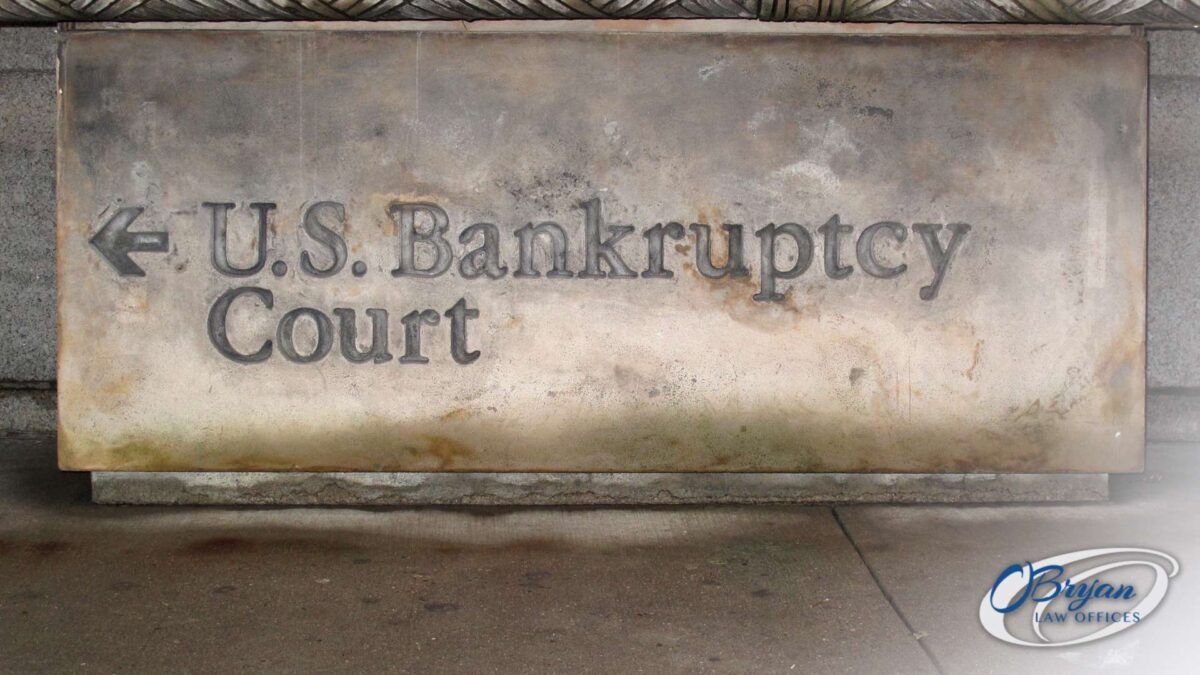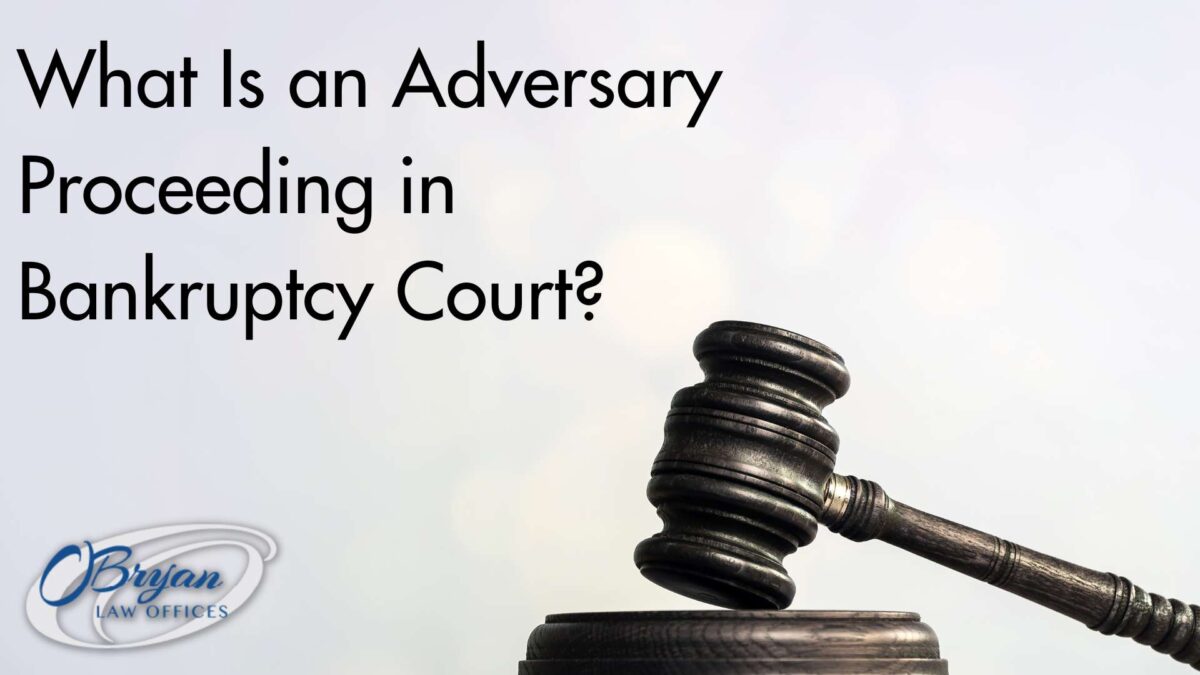An adversary proceeding is a separate lawsuit within a bankruptcy case that addresses disputes requiring court intervention. Governed by Bankruptcy Rule 7001 and sections 523, 727, 547, and 548 of the U.S. Bankruptcy Code, it functions much like a civil lawsuit under the Federal Rules of Bankruptcy Procedure.
These proceedings often involve challenges to a debtor’s discharge, disputes over liens, allegations of fraud, or efforts to recover property for the bankruptcy estate. They play a vital role in ensuring fairness when the integrity of a discharge or creditors’ rights are in question.
At O’Bryan Law Offices, we guide clients through adversary proceedings with skill and determination, protecting their rights at every stage. If you’re facing an adversary proceeding—or want to understand how one could affect your bankruptcy—call us at (502) 339-0222 to schedule a free consultation with an experienced Louisville bankruptcy attorney.
Why Might an Adversary Proceeding Happen?
Adversary proceedings in bankruptcy cases are crucial in addressing specific legal disputes that emerge during bankruptcy. These proceedings are akin to a separate lawsuit within the bankruptcy case and are governed by distinct rules. The reasons for an adversary proceeding can vary, but some common triggers include the following reasons.
Alleged Fraud
Alleged fraud, particularly involving debt incurred with deceptive intentions, is a critical issue in bankruptcy cases. These allegations often surface when a creditor or the bankruptcy trustee suspects that the debtor has engaged in fraudulent activities. Such activities can include concealing assets, making false statements in bankruptcy documents, or incurring debt without any intention of repaying it.
In these adversary proceedings, the burden is on the plaintiff to establish the fraudulent conduct of the debtor, which typically requires showing intentional deception or misrepresentation related to the debt incurred. The ramifications of proven bankruptcy fraud are significant, potentially leading to the refusal of discharge for the implicated debts or, in more severe cases, criminal charges.
Alleged Preferential Transfers
Allegations of preferential transfers are another issue that can result in an adversary proceeding. These allegations occur when it is believed that a debtor made payments or transferred assets before filing bankruptcy to certain creditors, showing preference.
Under bankruptcy law, such transfers can be scrutinized within a defined period before the bankruptcy filing (typically 90 days for regular creditors and one year for insiders). This review aims to ensure equal treatment of all creditors and prevent any debtor from favoring certain creditors. If a transfer is deemed preferential, the bankruptcy trustee may seek to recover those assets or payments so they can be redistributed fairly among all creditors.
Fraudulent Transfers (§ 548)
A fraudulent transfer can lead to an adversary proceeding in a bankruptcy when a debtor moves assets to another person or entity in an attempt to hide them from creditors. These transactions often occur shortly before filing and may involve selling property for far less than its actual value or giving valuable assets to friends or family.
Under § 548 of the Bankruptcy Code, the trustee may challenge these transfers and pursue a “clawback,” bringing the property or its value back into the bankruptcy estate. This ensures that assets are distributed fairly among creditors and that no debtor can sidestep financial responsibility by shifting property out of reach before filing.
Owning Property With Someone Else
Owning property with someone else can trigger an adversary proceeding during bankruptcy, especially when determining the division and control of jointly held assets. In such adversary proceedings, the bankruptcy court examines the nature of the joint ownership, whether it is tenancy in common, joint tenancy, or tenancy by the entirety, to decide how the property should be handled.
Disputes often happen when one co-owner files for bankruptcy, potentially affecting the rights and interests of the non-filing co-owner. The bankruptcy court must then assess whether the debtor’s share in the property can be used to satisfy debts to creditors while also considering the legal protections that may apply to the non-filing co-owner.
Running Up Credit Card Balances Before Filing
Running up credit card balances before filing bankruptcy is a serious issue that can result in an adversary proceeding. This occurs when a debtor significantly increases their credit card spending or incurs substantial debt shortly before filing for bankruptcy. Creditors may view this as an attempt to discharge debt never intended to be repaid, leading to allegations of fraudulent intent.
In such cases, creditors or the bankruptcy trustee may challenge the dischargeability of these debts, arguing that they were incurred under false pretenses. The court then examines the expenses’ timing, nature, and purpose to determine if they were legitimate or constituted abuse of the bankruptcy system.
Challenges to Dischargeability of Debt (§ 523)
Creditors may argue that certain debts—such as those incurred by fraud, embezzlement, or willful injury—should not be discharged. These nondischargeability actions are among the most common adversary proceedings and can significantly impact the debtor’s financial fresh start.
Objections to Overall Discharge (§ 727)
Unlike dischargeability actions (which target specific debts), an objection to discharge challenges the debtor’s entire right to a bankruptcy discharge. Creditors or the U.S. Trustee may file these if they believe the debtor concealed property, falsified records, or otherwise abused the bankruptcy process.
Lien Disputes
Creditors may litigate over the validity, priority, or extent of liens. These disputes are especially important when multiple creditors claim security interests in the same property. Because lien challenges can be complex, having legal counsel to conduct a thorough review of the competing claims is essential. The court ultimately determines who has enforceable rights and in what order they may collect.
Divorce-Related Debt & Domestic Obligations
Former spouses may initiate adversary proceedings to enforce divorce settlements or division of marital debt. Similarly, domestic support obligations (like child support or alimony) are usually nondischargeable, and disputes often arise during bankruptcy proceedings.
Automatic Stay Violations
When creditors ignore the automatic stay—which prohibits collection actions once bankruptcy is filed—the debtor may bring an adversary proceeding against them. Courts take stay violations seriously, and debtors may be entitled to damages, attorney’s fees, and sanctions against the creditor.
| Type of Adversary Proceeding | Who Typically Files | Key Issue | Possible Outcome |
|---|---|---|---|
| Fraud / False Pretenses | Creditor / Trustee | Concealing assets, lying on documents, incurring debt with no intent to repay | Denial of discharge for debts; potential criminal charges |
| Preferential Transfers (§ 547) | Trustee | Payments to favored creditors shortly before filing | Recovery and redistribution of payments/assets |
| Fraudulent Transfers (§ 548) | Trustee | Transferring assets to hide them from creditors | Clawback of assets into estate |
| Property Ownership Disputes | Trustee / Co-Owner | How jointly owned property is divided or liquidated | Court determines treatment of debtor’s share |
| Running Up Credit Card Debt | Creditor | Sudden spending before filing, seen as bad faith | Denial of discharge for those debts |
| Nondischargeability (§ 523) | Creditor | Certain debts (fraud, embezzlement, willful injury, student loans, etc.) | Specific debts ruled nondischargeable |
| Objection to Overall Discharge (§ 727) | Creditor / U.S. Trustee | Misconduct like hiding property or falsifying records | Entire discharge denied |
| Lien Validity / Priority Disputes (§ 506) | Creditors / Trustee | Competing claims to collateral or disputes over secured status | Court decides lien rights and order of priority |
| Divorce / Domestic Obligations | Former Spouse / Creditor | Joint debts, alimony, child support, or divorce settlement obligations | Obligations often remain nondischargeable |
| Automatic Stay Violations | Debtor | Creditor continues collection despite bankruptcy stay | Damages, attorney’s fees, sanctions |
How Long Does Someone Have to Answer a Bankruptcy Proceeding?
A defendant has 30 days to respond after being served with the summons and complaint of the adversary proceeding. This 30-day period is crucial, as it allows the defendant to prepare an appropriate response, whether a formal answer, a motion to dismiss, or other legal pleadings, to address the claims raised against them.
It’s important to adhere to this deadline, as failing to respond within the allotted time can lead to a default judgment, where the bankruptcy court may grant the plaintiff’s requests without further input from the defendant.
What Are the Stages of an Adversary Proceeding According to Federal Rules?

Adversary proceedings in bankruptcy follow a process similar to federal civil lawsuits but with specific rules and deadlines under the Federal Rules of Bankruptcy Procedure. The main stages include:
- Filing the Complaint – The proceeding begins when a creditor, trustee, U.S. Trustee, or debtor files a complaint outlining the dispute.
- Summons & Service – The court issues a summons that must be properly served on the defendant within the required time.
- Response (30 Days) – The defendant has 30 days to file an answer or motion; failing to respond can result in default judgment.
- Discovery – Both sides exchange evidence through interrogatories, depositions, and document requests.
- Pre-Trial Motions – Parties may file motions, including summary judgment, to resolve issues before trial.
- Trial – If unresolved, the case goes to trial before a bankruptcy judge, where evidence and testimony are presented.
- Judgment – The court issues a ruling that resolves the dispute, which may affect the overall bankruptcy case.
- Appeal – Final judgments can be appealed to the district court or a Bankruptcy Appellate Panel.
Adversary Proceedings vs Contested Matters

Adversary proceedings and contested matters are two distinct types of legal disputes that can arise in the context of a bankruptcy case, each governed by different procedural rules. An adversary proceeding is a formal lawsuit within a bankruptcy case, comparable to a civil trial, and is used for more complex disputes. Governed by the Federal Rules of Bankruptcy Procedure, these proceedings address issues like objections to the debtor’s discharge, allegations of fraud, and disputes over liens or asset ownership. They require filing a complaint, serving it to the involved parties, and following a process similar to regular court cases, including discovery, trial, and potential appeals.
On the other hand, contested matters are less formal and are used for simpler disputes that arise during the bankruptcy process. These might include objections to claims, motions to lift automatic stays, or disputes over the use of cash collateral. Contested matters are typically resolved through motions and hearings in front of a bankruptcy judge without the full procedural hype of an adversary proceeding.
Practical Tips for Handling an Adversary Proceeding
Adversary proceedings can feel overwhelming, but understanding a few key points can help you stay on track and protect your rights:
- Don’t Ignore Deadlines: You generally have 30 days to respond after being served. Missing this deadline can result in a default judgment against you.
- Take Summons Seriously: Receiving a summons means you are being sued within your bankruptcy case—prompt legal action is critical.
- Consider Settlement Early: Many adversary proceedings are resolved through negotiation or mediation, saving time and costs compared to trial.
- Coordinate With Your Bankruptcy Case: Decisions in the adversary proceeding may impact your overall bankruptcy outcome, so your legal strategy should align with your broader financial goals
- Get Experienced Guidance: Not all bankruptcy attorneys handle adversary proceedings. Work with a lawyer experienced in bankruptcy litigation to maximize your chances of success
Contact a Kentucky Bankruptcy Lawyer with O’Bryan Law Offices
When navigating the complexities of bankruptcy, having the guidance and support of a trusted legal partner is invaluable. At O’Bryan Law Offices, our team of bankruptcy lawyers is dedicated to helping you achieve a fresh financial start. If you’re facing financial challenges and seeking Kentucky debt relief solutions, we are here to provide counsel and tailored strategies to meet your needs.
Schedule a free consultation with an experienced Kentucky bankruptcy lawyer by calling 502-339-0222.
Frequently Asked Questions
Bankruptcy proceedings include the main bankruptcy case (such as Chapter 7, 11, or 13) and related disputes that may arise. Within a bankruptcy, a party may file an adversary proceeding (a formal lawsuit within the case) or raise a contested matter (a simpler dispute handled through motions and hearings). Both are common in the practice of bankruptcy law.
While many debts can be wiped out in bankruptcy, some are generally nondischargeable, including:
- Child support and alimony
- Most student loans
- Certain tax debts
- Debts incurred by fraud or willful misconduct
- Court fines and criminal restitution
These often become the subject of adversarial disputes in bankruptcy when creditors challenge discharge.
An adversary proceeding is a separate lawsuit within a bankruptcy case, involving formal steps like a complaint, discovery, and trial. Contested matters are less formal disputes, such as objections to claims or motions to lift the automatic stay, and are usually resolved more quickly. Knowing when to file an adversary versus handling an issue as a contested matter is a key part of effective bankruptcy practice.
The deadline to file an adversary proceeding depends on the type of claim being made. For example, creditors usually have 60 days from the first meeting of creditors to challenge the dischargeability of certain debts under Section 523 of the Bankruptcy Code. Other claims, such as fraudulent transfer or preference actions, may have different time limits. Missing these deadlines can prevent the claim from being heard, which is why timely action with the help of legal counsel is essential.




